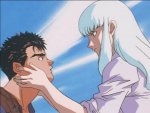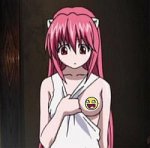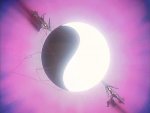Berserk
(25 episode series)
Set in a Western Medieval fantasy world, I have to admit that
Berserk didn't really appeal to me all that much at first. Actually, most of the series didn't have the appeal to me that it probably has to most of its fans, simply because the hack-n-slash battles just don't appeal to me all that much, and the way everyone who wasn't a main or supporting character tended to be cut down like grass didn't help any. From what I'd read about this series ahead of time, though, I was convinced that this series would come through for me, and it did, despite many handicaps.
This series follows Guts, a large muscular man who wields an impossibly large sword. The series starts in media res, with Guts seeking revenge against the demonic members of the Godhand and the abusive, oppressive people who surround them. He is specifically seeking revenge against one named Griffith, and a few relevant flashbacks are shown before the series dives into the past to show us how Guts came to be the way we first see him. I'd already been spoiled about the ending of this series, as frankly I actually like to read about this kind of information ahead of time anyway. For those who haven't been spoiled, though, the first episode of the series would probably act as sufficient warning not to take Griffith for face value as the stereotypical enigmatic leader he appears to be for most of the series. Of course, if you haven't been spoiled about this series, you soon will be by reading this review.

As I mentioned, for the most part, this series is a fairly typical hack-n-clash Medieval warfare story, with impossible characters doing impossible things. A number of clichés were present that made it impossible for me to enjoy that aspect of the series too much, such as armor only actually doing its job for important characters, while for everyone else it was basically just tissue paper. It is just a show, though, and I'm sure for some people the idea of a show that mostly consists of people hacking each other apart with swords or shooting crossbows at each other has an appeal of its own. For me, though, the appeal came mainly from the themes of the show, such as camaraderie, and how people, especially leaders, can feel isolated despite that. Aspects of human nature are also explored, mostly addressed by having characters that actually had some depth to them. Guts, for example, is basically the stereotypical barbarian who really just likes to kill people, and yet he makes a competent military leader and not only cares for the lives of those under his command, but of people in general, even if he doesn't always involve himself. In a way, he's kind of like a spaghetti western Clint Eastwood character. Griffith, on the other hand, seems very much like a good leader, who cares about those who follow him, but later reveals that all he really cares about is his dream of having his own kingdom. Hints of this are shown before his final betrayal of the band of mercenaries he leads, the Band of the Hawk, though even as he betrays them, it's still made clear that this wasn't originally his intention, and he even initially attempts to prevent their destruction.
The majority of the series takes place during a "100 Year War" between the kingdoms of Midland and Chudar. Guts started out as a wandering mercenary who made something of a reputation for himself through his disproportionate fighting ability. As fate would have it, he comes across the Band of the Hawk after the battle and a few of them decide to rob him. Griffith, seeing Guts single-handedly fight off these attackers, challenges him to a duel which will decide whether Guts can go free or not. In the end, Guts loses and is essentially forced to join the Band of the Hawk.
As an aside, I'll note that
Berserk seems to have a large number of yaoi fans (dude on dude love to you non-anime nerds reading this), and for once it actually wasn't all in their heads, because frankly the series wasn't helping anything.

The one on the right is Griffith, and yes, he's a dude.
What with all the "you belong to me Guts" and the way Griffith practically fawns over him, it's kind of hard not to notice that aspect of it even if yaoi and yaoi fans make you roll your eyes like it does for me. Still, it's pretty obvious that Guts doesn't think of Griffith that way, and Griffith pretty much seems to frak whoever will advance him toward his goal. Anyway...
As the war goes on, both Guts and the Band of the Hawk make a name for themselves, with Guts being promoted to captain of a unit of raiders within the Hawks, and the Hawks themselves eventually coming to be recognized by the king of Midland, and becoming an official part of Midland's army. Through it all, Griffith has to constantly fight off assassination attempts, though he always manages to stay a step ahead, or to just turn out to be extremely lucky. Griffith credits his luck and his success to the ugly red "Egg of the King" he wears around his neck, which looks like something Picasso might've carved, and which also acts as a constant reminder of the kind of character Griffith really is. Griffith and the Hawks' do so well that they are eventually raised to the level of white knights and are recognized as the best unit within the Midland army, with Griffith holding the rank of general. Just to sweeten the deal, Griffith seems to be lining himself up to romance the princess. One can only guess at what Griffith's original plan was, but apparently Guts deciding to strike out on his own again and actually winning in a second duel with Griffith made him lose his edge. So, in spite of winning a century long war and doing so much for Midland, sleeping with his daughter was a berserker button for the king, and not only was Griffith arrested and tortured for a year, but the king ordered the destruction of the Band of the Hawk, even though they not only had nothing to do with Griffith's little nighttime escapades, but had no idea anything had happened. So, yeah, winning the war and doing nothing but good for the kingdom means nothing when your commanding officer fraks the king's daughter, apparently.
Guts returns from a year of wandering to help save the Hawks, hopefully by saving Griffith. Unfortunately, they are way beyond too late, because Griffith is skin and bones, and has had the tendons in his wrists and his ankles cut, meaning he can never stand or grasp anything again even if he managed to recover his weight and health otherwise. Oh, and his tongue has been cut out, so he can't even so much as give rousing speeches anymore. All for dipping his wick in the royal well. Hope she was worth it, Griffith.

Apparently, this was all part of the red egg's plan, because following a suicide attempt by Griffith, some of his blood gets on it and causes it to rearrange itself into a normal-looking face, except for the tears of blood streaming out of it. It's also apparent at this point that Griffith really did think the thing was only a trinket, and that only then did he understand the implications of what was happening. He tries to warn Guts, but unfortunately he doesn't have a tongue anymore, and both Guts and the entirety of the Band of the Hawk are transported to a nightmarish landscape, followed shortly afterwards by the majority of them being eaten alive by demons. Oh, spoilers.

So I'm sure some of you are wondering why I haven't mentioned Guts's very own tsundere, Casca. For those of you not in the know, basically tsundere means that Casca acts like a bitch to Guts, but deep down it's really because she likes him and totally wants to jump his bones. I didn't mention her before because she deserves her own section to address why she is both a positive and a negative for the series. She's a positive in that she's shown to be a competent commander, strong, and respected by those who follow her. That
would be a good thing, and she'd be one of the few strong female characters I've seen in anime. Unfortunately, she really isn't, because it's all undone by her constant moodiness, and the way she is completely unreasonable and tends to get angry at pretty much anything. Then there's the way she tends to need to be rescued by Guts, all while she's apparently pining after Griffith and constantly blaming Guts for anything bad that happens to Griffith. I might have given this aspect of the series more of a pass if it had flowed a little more naturally, but I just couldn't see past what I saw as an obvious tsundere for Guts to win over, and how stereotypically moody and unreasonable her character was made to be. It all just seemed rather forced to me.
From a technical standpoint, all I can really say is that it's really too bad that this series's budget didn't match the ambition of the story. People who have only seen newer anime will probably be turned off by how primitive this series looks compared to pretty much anything that's come out in the last decade. It's the kind of stuff that the stereotypical anime nerd of the past would gush about as far as the supposedly brilliant ways animators would cut corners so they could actually afford to finish the series on the laughable budget they were given. So there are a lot of static drawings, many of which are moved around a lot to simulate something like shakey-cam, and some of which are panned multiple times to signify a powerful strike of some kind. Not sure why they always did it three times, but whatever. This kind of stuff normally wouldn't bother me that much, but it's just used so much in this series that it really wears on me. It makes me wonder what this series might've been if it'd actually had a decent budget. The soundtrack is the one saving grace, but it too has its drawback in that there just aren't that many tracks in it. So while the music is used fairly effectively, you hear the same tracks over and over in this series. I'm going to go out on a limb and guess budget had a lot to do with that, too. In any case, this series may be disappointing on the technical side to some viewers, though story and character-wise it has plenty of positives.
Honestly I'm looking forward to the new movies that are coming out, which are supposed to follow the manga the series was based on more closely. To be fair, though, from what I've read, the main reason the series didn't follow the manga as closely, aside from time constraints, had mostly to do with the fact that the manga wasn't, and in fact still isn't finished. It started in 1990, by the way. I can only hope then that a few areas will be cleared up for me that were left somewhat unaddressed in the series, such as how Guts survived the betrayal of the Hawks to become the "Black Swordsman" seen at the very beginning and very end of the series. Casca's final fate is also left unaddressed, as is Griffith's for that matter, though to be fair these plot points remaining unknown or ambiguous didn't really spoil my enjoyment of the series. That was mainly done by the fighting and romance clichés.
I'd still recommend this series, though. The main thing is just to know what you're getting into, because it's one hell of a doozy of an ending, and being an older anime there are just some things about it that fans of newer anime might have a hard time getting past. 8/10.








